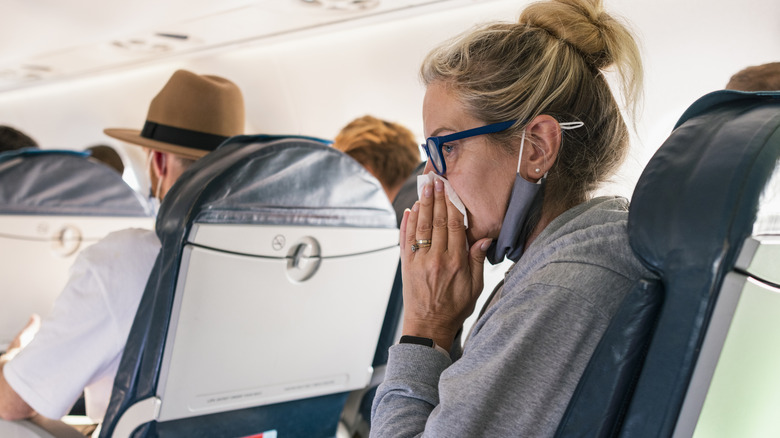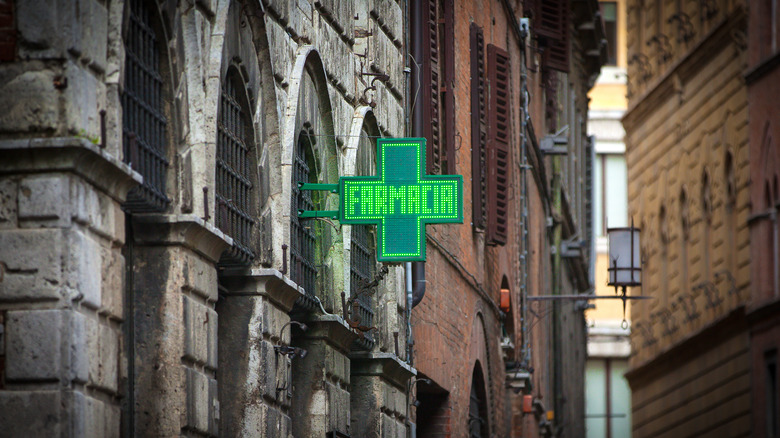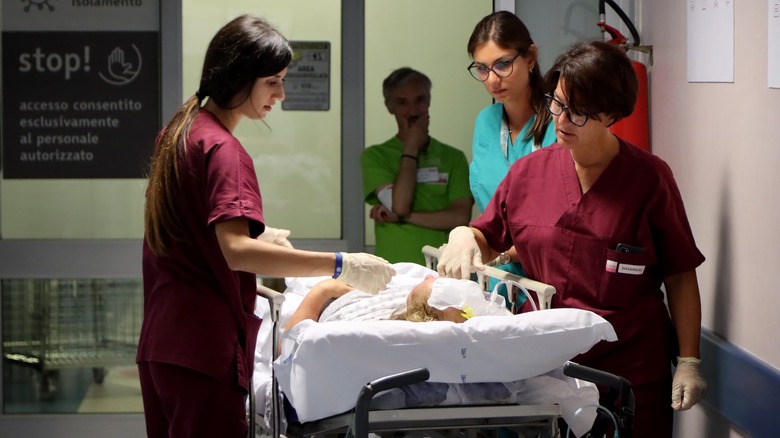Here's What To Do If You Get Sick While Visiting Italy, According To Experts
Whether you're heading to Italy for your honeymoon, to get in touch with your roots, or to try the delicious street food, you probably don't want to miss a second of your vacation. Unfortunately, if you get sick while you're traveling, you may have to slow down and take care of yourself to recover. If you need medication, you'll need to visit a local pharmacy and discuss your symptoms with the pharmacist. And if you're seriously ill, you might even need to contact the appropriate embassy and find out which hospitals and doctors can help you.
"You can assume that travel will increase the risk of getting sick, and none of us wants to get sick while traveling," Dr. Henry M. Wu, director of the Emory TravelWell Center, told HuffPost. He advised taking extra precautions, including getting any vaccines recommended by your doctor before heading to the airport. Not only are we exposed to all kinds of germs that our bodies don't usually have to deal with, general practitioner Dr. Suhail Hussain told the Independent that finally relaxing on vacation can actually make us feel sick, too. "When the body is used to functioning on high levels of cortisol and adrenaline and they suddenly decrease, our immune system is exposed and then we're prone to minor infections and excessive tiredness," he said. "Pain and muscle aches also increase."
If your insurance doesn't cover healthcare in Italy, you may want to consider short-term international insurance plans. You can purchase one through an insurance broker, travel agent, employer, credit card company, or bank. No matter what, you should make sure that you have your medical information — like prescriptions and medical conditions — written down in case of emergency.
What to do if you feel a little sick on your vacation
You probably know how to catch the bus, grab a bite on a tight budget, and all the other hacks tourists need to know for a vacation in Italy. But do you know what to do if you wake up in Rome with a stuffy nose and a sore throat? As frustrating as it may be to dial back your itinerary, your first step should be resting up and drinking plenty of water. It's better to miss one day of your trip and wake up refreshed and ready to explore than to push through and make yourself sicker for your entire vacation. As Dr. Heather Finn explained for Upstate Medical University: "Extra sleep can help your immune system function at its best and potentially shorten the duration of your illness."
As described by travel expert Rick Steves on his website Rick Steves' Europe, pharmacists can generally prescribe and recommend basic medicines for basic health issues, so they should be your first stop for mild illnesses while you're traveling in Europe. Depending on your symptoms, you may require farmaci da banco, aka over-the-counter medications. You can find common treatments in some supermarkets and anywhere with a lit-up green cross outside, which indicates pharmacies in Italy. According to Saturdays in Rome travel guide Beppe Castro, all you have to do is tell a pharmacist your symptoms and they will advise you on which medications to take — typically things like acetaminophen, antihistamines, and Benagol lozenges. In major cities there will probably be an English-speaking pharmacist, but there aren't, you can always use your phone to translate.
What to do if you need to see a doctor in Italy
If you or someone traveling with you is having a medical emergency, you will need to call 112 for an ambulance. According to the U.S. Embassy & Consulates in Italy, there is no guarantee that emergency medical professionals in Italy will speak English. However, major cities typically have international hospitals where there is usually English speaking staff who can assist you.
While Italy does have universal healthcare, there are still private hospitals and clinics, and not every doctor visit is free, even for Italians. Whether you're an Italian citizen or not, though, you can get emergency care without paying upfront. European Union citizens can get care using their European Health Insurance Card (EHIC), while the CDC says travelers from elsewhere may have to consult the closest appropriate embassy or consulate for a list of medical professionals in the area that can assist them.
The U.S. Embassy & Consulates in Italy website features lists by region that you can check out online. The International Society of Travel Medicine also has a database you can search which will help you find all kinds of clinics and medical providers in Italy. For resources regarding health while traveling in Italy and everywhere else around the globe, including mental health resources, check out the International Association For Medical Assistance To Travellers (IAMAT). Fortunately, in an interview with Live in Italy Magazine, Katie Palumbo, a former U.S. citizen who moved to Florence, stated that the quality of Italian healthcare is comparable to that of U.S. healthcare — but significantly cheaper.


